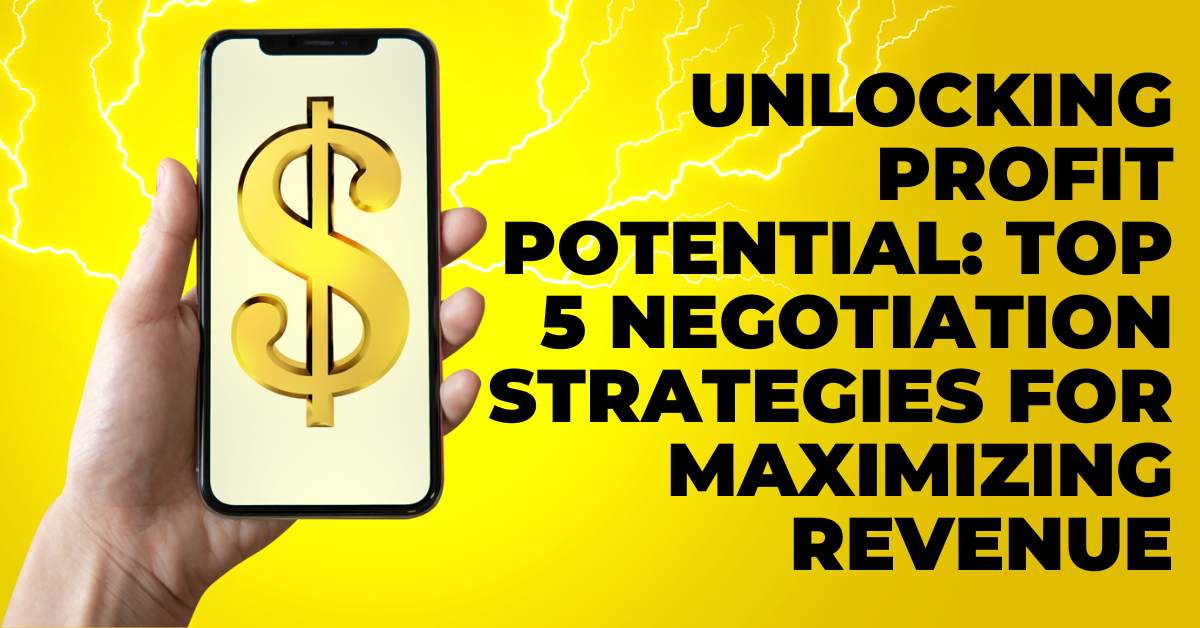Table of Contents:
- Introduction
- Understanding the Importance of Negotiation in Revenue Maximization
- Top 5 Negotiation Strategies
- Strategy 1: Preparation is Key
- Strategy 2: Focus on Creating Value
- Strategy 3: Know When to Walk Away
- Strategy 4: Utilize Power Dynamics
- Strategy 5: Build Long-Term Relationships
- Conclusion
Introduction
Negotiation is a fundamental skill in the business world, crucial for maximizing revenue and profitability. Whether you’re closing deals with clients, suppliers, or partners, your ability to negotiate effectively directly impacts your bottom line. In this article, we’ll delve into the top five negotiation strategies to unlock your profit potential and propel your business to success.
Understanding the Importance of Negotiation in Revenue Maximization
Negotiation is more than just haggling over prices; it’s about finding mutually beneficial solutions that optimize value for all parties involved. By mastering negotiation techniques, businesses can secure better deals, improve margins, and foster stronger relationships with stakeholders.
Top 5 Negotiation Strategies
Strategy 1: Preparation is Key
Successful negotiations begin long before you sit down at the bargaining table. Thorough preparation is essential for understanding your own objectives, as well as those of the other party. Research market conditions, competitors, and the needs and motivations of your counterpart. Anticipate potential objections and devise persuasive arguments to overcome them. The more informed and prepared you are, the greater your advantage in negotiations.
Strategy 2: Focus on Creating Value
Instead of viewing negotiation as a zero-sum game where one party’s gain is another’s loss, adopt a collaborative mindset focused on creating value. Identify areas where you can offer concessions that are of high value to the other party but have minimal cost to your business. By emphasizing the benefits of reaching a mutually satisfactory agreement, you can foster goodwill and increase the likelihood of a successful outcome.
Strategy 3: Know When to Walk Away
While it’s essential to be flexible and open to compromise, it’s equally important to know your limits and when to walk away from a deal that doesn’t meet your minimum requirements. Establish clear BATNAs (Best Alternative to a Negotiated Agreement) and be prepared to leverage them if necessary. Demonstrating a willingness to walk away can signal to the other party that you’re serious about your objectives and compel them to make concessions to keep the deal alive.
Strategy 4: Utilize Power Dynamics
Understanding power dynamics is critical in negotiation. Identify sources of power, such as expertise, leverage, or alternatives, and leverage them to your advantage. Project confidence and authority while remaining respectful and professional. However, be mindful of not abusing power, as it can damage relationships and undermine trust. Strive for a balance that allows both parties to feel empowered and respected throughout the negotiation process.
Strategy 5: Build Long-Term Relationships
Negotiation isn’t just about securing short-term wins; it’s about building lasting relationships that benefit your business over time. Invest in cultivating trust and rapport with your counterparts, even when negotiations are challenging. Act with integrity, follow through on commitments, and seek opportunities for collaboration beyond the current deal. By nurturing long-term relationships, you can create a foundation of mutual trust and cooperation that enhances future negotiation outcomes.
Conclusion
Effective negotiation is a cornerstone of revenue maximization in business. By implementing the top five negotiation strategies outlined in this article—preparation, value creation, knowing when to walk away, utilizing power dynamics, and building long-term relationships—you can unlock your profit potential and achieve sustainable success. Remember, negotiation is not just about securing favorable deals; it’s about creating value, fostering relationships, and driving your business forward.
By mastering these strategies and approaching negotiations with a strategic mindset, you can navigate complex business dynamics with confidence and achieve optimal outcomes for your organization.
